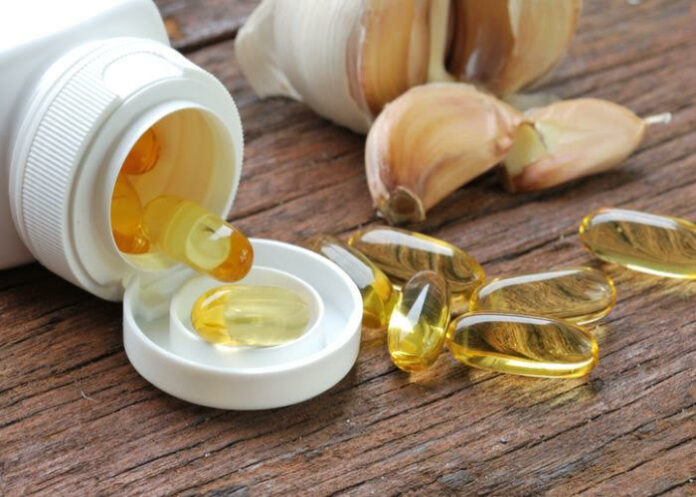A randomised trial has found that for people without heart disease, preventive low-dose statin therapy lowered LDL cholesterol to a degree unmatched by dietary supplements and placebo, with the study’s worst performer being a garlic supplement.
People taking 5mg of rosuvastatin per day for four weeks had an average 37.9% reduction in LDL cholesterol, the only group to do better than the placebo arm in a study that also had comparator groups taking fish oil, cinnamon, garlic, turmeric, plant sterols, or red yeast rice (P<0.001 for all comparisons).
The researchers found that a garlic supplement actually increased LDL cholesterol by 7.8% over placebo (P=0.01), according to Dr Luke Laffin of the Cleveland Clinic, who presented the SPORT trial at the American Heart Association (AHA) annual meeting this week. The findings were published simultaneously in the Journal of the American College of Cardiology.
He urged cardiologists, primary care physicians, and others to use the SPORT trial results in evidence-based discussions with their patients who need to lower LDL cholesterol. To provide reassurance, he pointed to the lack of excess side effects – gastrointestinal, musculoskeletal, or neurological – among statin users in the study.
The SPORT trial results come as statins and other prescription heart drugs struggle to gain acceptance among patients, despite strong evidence for their cardiovascular benefits.
Meanwhile, dietary supplements marketed for “heart health” are ubiquitous and immensely popular, reports MedPage Today. Laffin said it was not uncommon to see patients taking 10-20 supplements, and many people prescribed a cholesterol-lowering medication opt to “go down the aisle” and take a supplement instead.
“This study sends an important public health message that dietary supplements commonly taken for ‘cholesterol health’ or ‘heart health’ are unlikely to offer meaningful impact on cholesterol levels,” he said.
The lack of benefit is not the only problem with these supplements.
“The supplement industry is practically an unregulated $50bn industry,” said Dr Janani Rangaswami, of George Washington University School of Medicine in Washington. She warned that no one really knows what supplement manufacturers put in their products, and that she has personally observed supplement-induced kidney injury in her nephrology practice.
According to Laffin, another problem with not knowing what’s in a dietary supplement is the potential for harmful drug-drug-interactions that may occur in people taking dietary supplements alongside their regular medications. There is just not enough safety information on the 90 000 supplements on the market today, he said.
Dr Amit Khera of UT Southwestern Medical Centre in Dallas acknowledged that patients may take dietary supplements for a variety of reasons. Turmeric, for example, is promoted for arthritis, digestive disorders, respiratory infections, allergies, liver disease and depression.
Now it can be said that taking these supplements instead of statins just to lower cholesterol, however, is definitively unhelpful and could cause harm, he said.
SPORT was a single-blind trial that enrolled 199 patients across the Cleveland Clinic Health System. Participants were required to be off statins, other prescription lipid-lowering therapy, and any of the tested supplements before entering the study. All had LDL cholesterol in the 70-189 mg/dL range and no history of atherosclerotic cardiovascular disease.
Laffin reported that beyond LDL cholesterol lowering, rosuvastatin outperformed fish oil, cinnamon, garlic, turmeric, plant sterols and red yeast rice in reducing total cholesterol and triglycerides.
Just like these supplements, however, the statin conferred no change in inflammation.
The investigators acknowledged that their study had limited statistical power to detect small benefits, if any, to the dietary supplements.
Study details
Comparative Effects of Low-Dose Rosuvastatin, Placebo and Dietary Supplements on Lipids and Inflammatory Biomarkers
Luke Laffin, Dennis Bruemmer, Michelle Garcia, Danielle Brennan, Ellen McErlean, Douglas Jacoby, Erin Michos, Paul Ridker, Tracy Wang et al.
Published in Journal of the American College of Cardiology on 6 November 2022
Abstract
Background
Supplements are commonly used by individuals with indications for lipid lowering therapy but evidence of their effectiveness to lower low-density lipoprotein cholesterol (LDL-C) is lacking, particularly when compared with statins.
Methods
The trial objective was to compare the efficacy of a low-dose statin with placebo and six common supplements in impacting lipid and inflammatory biomarkers. It was a single-center, prospective, randomised, single-blind clinical trial among adults with no history of atherosclerotic cardiovascular disease (ASCVD), an LDL-C of 70-189 mg/dL and an increased 10-year risk of ASCVD. Participants were randomised to 5 mg daily of rosuvastatin, placebo, fish oil, cinnamon, garlic, turmeric, plant sterols or red yeast rice. The primary endpoint was the percent change in LDL-C from baseline for rosuvastatin 5 mg daily compared with placebo and each supplement after 28 days. The primary endpoint was evaluated in a hierarchical fashion with rosuvastatin first compared with placebo, then each supplement in a prespecified order using ANCOVA.
Results
190 participants completed the study. The percent LDL-C reduction with rosuvastatin was greater than all supplements and placebo (p <0.001). The difference in LDL-C reduction with rosuvastatin compared with placebo was -35.2% (95% confidence interval, -41.3 to -29.1, p <0.001). None of the dietary supplements demonstrated a significant decrease in LDL-C compared with placebo. Adverse event rates were similar across study groups.
Conclusions
Among individuals with increased 10-year risk for ASCVD, rosuvastatin 5 mg daily lowered LDL-C significantly more than placebo, fish oil, cinnamon, garlic, turmeric, plant sterols, and red yeast rice.
MedPage Today article – Study Refutes Heart Health Claims of Dietary Supplements (Open access)
See more from MedicalBrief archives:
Benefits of statins may have been overstated – Irish meta-analysis
Statins cut peripheral artery disease mortality, even when started long after diagnosis
After years of uncertainty, meta-analysis finds statins benefit all ages
Statins with Mediterranean diet reduces cardiovascular mortality risk

